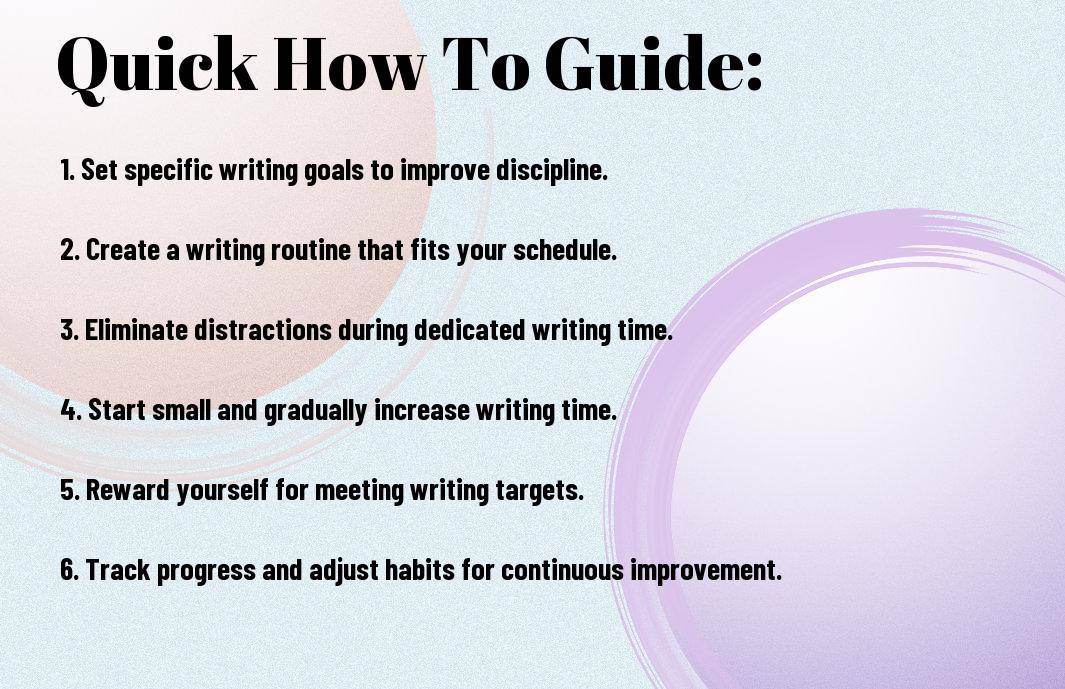Atomic Habits for writers! Many writers struggle with maintaining writing discipline at some point in their careers. Whether it’s staying consistent with daily word counts or avoiding distractions, developing atomic habits can make a significant difference in enhancing your writing discipline. In his book Atomic Habits: Tiny Changes, Remarkable Results by James Clear, James Clear explores the power of small habits and how they can lead to big outcomes.
Key Takeaways:
- Start small: Break down writing goals into tiny habits that are easy to achieve daily.
- Establish a routine: Create a specific time and place for writing to develop consistency.
- Use temptation bundling: Pair an enjoyable activity with writing to make it more enticing.
- Track progress: Keep a writing log or journal to monitor improvement and stay motivated.
- Reward yourself: Celebrate achieving writing milestones to reinforce positive behavior.
- Find an accountability partner: Share goals with someone who can help keep you on track and offer support.
- Iterate and refine: Continuously assess and adjust your writing habits to optimize productivity and creativity.

Laying the Foundation
Some writers struggle with maintaining a consistent writing routine despite their best intentions. If you are looking to develop an unbreakable daily writing habit, incorporating the principles of Atomic Habits for an unbreakable daily writing habit – Lifelog could be the key to success. By understanding how habits are formed and leveraging the science behind consistency and improvement, writers can lay a strong foundation for their writing discipline.
Understanding Habit Formation for Writers
Assuming you want to make writing a daily habit, you need to comprehend how habits are formed. According to behavioral psychology, habits consist of a cue, routine, and reward. By identifying your writing cue, establishing a writing routine, and rewarding yourself for completing your writing session, you can begin to solidify a habit that will sustain your writing practice.
The Science Behind Consistency and Improvement
Even with the best intentions, writers can struggle to maintain consistency in their writing practice. The key to overcoming this hurdle lies in understanding the science behind consistency and improvement. Consistency breeds improvement, and regular writing sessions not only hone your skills but also train your brain to be more creative and productive. By committing to a consistent writing schedule, you can tap into the power of incremental progress and see significant improvements in your writing over time.
Environment Design
Keep your writing space organized and inspiring to enhance your writing discipline. Your environment plays a crucial role in shaping your habits and mindset as a writer. By designing a space that fosters creativity and focus, you can set yourself up for success in your writing journey.
Crafting Your Ideal Writing Space
For crafting your ideal writing space, ensure that it is clutter-free and well-decorated to spark your creativity. Choose a comfortable chair and desk, add some plants or inspirational quotes, and let natural light in to create a welcoming atmosphere for your writing sessions. Customize your space to reflect your personality and writing style, making it a place where you feel motivated and inspired to write.
Eliminating Distractions for Maximum Focus
Distractions can derail your writing progress and hinder your ability to stay focused. To eliminate distractions and maximize your focus, consider turning off notifications on your phone, blocking out noise with headphones or white noise, and setting specific writing times free from interruptions. Creating a distraction-free environment will help you concentrate on your writing tasks and boost your productivity.
Writing in a focused and distraction-free environment will not only improve the quality of your work but also help you develop a consistent writing routine. By eliminating distractions and creating an ideal writing space, you can cultivate the discipline needed to achieve your writing goals.
Starting Small
Now is the perfect time to enhance your writing discipline by starting small. Oftentimes, writers can feel overwhelmed by the idea of writing consistently. However, by breaking it down into smaller, more manageable tasks, you can make significant progress in your craft.
The Two-Minute Rule for Writing
One powerful strategy to kickstart your writing habit is to implement the Two-Minute Rule. This rule suggests that you start by committing to writing for just two minutes each day. By setting such a minuscule goal, you make it easier to overcome the initial resistance and build momentum in your writing routine. After those two minutes are up, you may find yourself wanting to continue writing, which can lead to longer and more productive writing sessions.
Building Your Writing Habit Block by Block
If you want to develop a consistent writing habit, focus on building it block by block. Instead of pressuring yourself to write thousands of words in one sitting, aim to write a few hundred words every day. Over time, these small writing blocks will add up, and you’ll be amazed at the progress you’ve made. Consistency is key when it comes to forming a lasting writing habit, so celebrate each block of writing you complete.
Your writing habit is like a muscle that needs regular exercise to grow stronger. Consistency in your writing routine is more important than sporadic bursts of creativity. By showing up every day, even for just a few minutes, you’re reinforcing the habit and dedication to your craft. Note, Rome wasn’t built in a day, and neither will your writing masterpiece. Embrace the process and enjoy the journey of becoming a more disciplined writer.

The Pillars of Writing Discipline
Not everyone finds it easy to sit down and write every day. It takes discipline and commitment to hone your craft and produce quality work consistently. To become a successful writer, you need to build a strong foundation of writing discipline. Here are some key pillars to help you enhance your writing discipline:
Commitment to Daily Practice
You may not always feel motivated to write, but developing a commitment to a daily writing practice is necessary. Consistency is key when it comes to building good writing habits. Set aside a specific time each day to dedicate to your writing, even if it’s just for a short period. By showing up every day, you train your brain to get into the writing groove more easily.
Leveraging Motivation When It Wanes
You won’t always feel inspired to write, and that’s okay. It’s important to find ways to stay motivated even when the writing process feels challenging. Remember why you started writing in the first place and visualize your goals. Break down your writing tasks into smaller, more manageable steps to help you stay motivated and focused.
For instance, you can create a reward system for yourself, celebrating small victories along the way. This can help boost your motivation and keep you on track, especially during times when the writing journey feels tough.
Increasing Productivity
Setting Goals and Milestones
For writers, setting clear goals and milestones is crucial for enhancing productivity. The process of establishing specific objectives gives you a clear direction and purpose for your writing endeavors. Whether you aim to complete a novel, write a certain number of words each day, or submit your work to publications, having tangible goals can keep you focused and motivated.
Discovering Your Peak Writing Times
For writers seeking to boost productivity, it is important to identify your peak writing times – the moments of the day when you feel most creative and inspired. By understanding when you are most productive, you can schedule your writing sessions during these peak hours to make the most of your energy and focus. Whether you are a morning person who thrives before dawn or a night owl who does your best work after midnight, recognizing your optimal writing times can significantly improve the quality and quantity of your output.
Discovering your peak writing times may involve some experimentation. Try writing at different times of the day to see when you feel most engaged and creative. Pay attention to your energy levels, mood, and concentration during these sessions to determine when you are at your best. Once you have identified your peak writing times, make it a habit to reserve these hours for your most important writing tasks to maximize your productivity.
Overcoming Writer’s Block and Procrastination
Once again, you find yourself staring at a blank page, unable to put words together in a coherent manner. Writer’s block and procrastination are common challenges that writers face. However, with the right strategies, you can overcome these hurdles and get back to your writing groove.
Simple Strategies to Keep Writing Flowing
You don’t have to wait for inspiration to strike. Sometimes, the simple act of sitting down and starting to write can kickstart your creativity. Set aside specific times for writing each day and establish a routine that works for you. Breaking down your writing goals into smaller tasks can make them feel more achievable. Also, consider using prompts or writing exercises to get your creative juices flowing.
Using Accountability to Your Advantage
You can utilize the power of accountability to stay motivated and on track with your writing goals. Find a writing buddy, join a writing group, or enlist the help of a writing coach. Sharing your goals with others can create a sense of responsibility that motivates you to keep writing. Knowing that someone is expecting you to deliver can be a powerful incentive to overcome procrastination.
Having someone hold you accountable can provide the necessary push to help you stay consistent with your writing habits. This external support can help you stay focused, set realistic deadlines, and celebrate your writing milestones along the way.
Measuring Progress and Keeping Track
After reading Andrew M. Friday’s insightful article on Friday’s Findings: How Exactly Do the Atomic Habits Help Writers, you might wonder how to apply the principles of atomic habits to enhance your writing discipline. One key aspect of building and maintaining habits is measuring your progress and keeping track of your journey.
Journaling Your Journey
Some writers find journaling to be a powerful tool in their writing routine. Keeping a journal allows you to track your daily word count, note any challenges or successes you face, and reflect on your writing habits. By documenting your progress, you can identify patterns in your behavior and adjust your habits accordingly to optimize your productivity.
Reflecting on Improvements and Adapting Your Habits
There’s immense value in taking the time to reflect on your writing journey and acknowledge the progress you’ve made. Reflecting on improvements can help you celebrate your achievements and boost your motivation to continue building positive habits. Additionally, it’s important to be adaptable and willing to adjust your habits as needed. Embrace change as you strive for continuous growth and development in your writing process.
Conclusion
Ultimately, adopting atomic habits can greatly enhance writing discipline for any writer. By breaking down writing tasks into smaller, more manageable habits, writers can develop a consistent writing routine that leads to improved productivity and creativity. Whether it’s setting a daily word count goal, creating a designated writing space, or practicing self-reflection to identify areas for improvement, these small habits can add up to significant progress over time.
By understanding how to implement atomic habits and incorporating them into our writing routine, writers can overcome procrastination, writer’s block, and other obstacles that may hinder their progress. Developing these habits not only improves writing discipline but also fosters a love for the writing process, making it a more enjoyable and rewarding experience. So, why not start today and begin cultivating your own atomic habits for writing success?
FAQ
Q: Why is building atomic habits important for writers?
A: Building atomic habits is crucial for writers because it helps in enhancing writing discipline, creating consistency, and boosting productivity in the long run.
Q: What are atomic habits?
A: Atomic habits are small, daily changes or routines that compound over time to lead to significant improvements in your writing skills and discipline.
Q: How can writers develop atomic habits?
A: Writers can develop atomic habits by starting small, being consistent, tracking progress, and making incremental improvements in their writing routines.
Q: What are some examples of atomic habits for writers?
A: Examples of atomic habits for writers include setting aside a specific time each day for writing, writing a minimum number of words every day, or reading for inspiration before writing.
Q: How do atomic habits help in overcoming writer’s block?
A: Atomic habits help in overcoming writer’s block by providing a structured routine and motivation to write regularly, which can help in sparking creativity and breaking through mental barriers.
Q: What is the significance of consistency in building atomic habits for writers?
A: Consistency is key in building atomic habits for writers because it helps in forming new routines, creating momentum, and developing discipline over time, leading to improved writing skills and productivity.
Q: How can writers stay motivated to maintain their atomic habits?
A: Writers can stay motivated to maintain their atomic habits by setting clear goals, rewarding themselves for progress, finding accountability partners, and reminding themselves of the long-term benefits of their writing habits.



